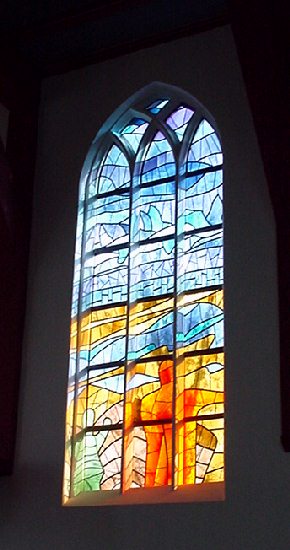The Hippolytus church
Wie was Hippolytus?
 |
|
The new window of the Hippolytus church, symbolising the connection between Hippolytus and the sea. |
Hippolytus, the saint the church in Hippolytushoef owes its name to, was a 3rd century Greekspeaking theologian in the eastern Mediterranean. He wrote a number of influential bible commentaries and played a leading role in the feuds that tore up the church in those days. The pope was not exactly a supporter of Hippolytus' ideas and so the man found himself exiled to the island of Sardinia, where he died.
Soon after his death opinions changed and Hippolytus was sanctified.
But why was a church in far away Frisia named after a Greek theologian?. The answer to this question is not simple, but it is surprising. In the early middle ages churches were not named after the "saint of the week" and not yet after saints who were popular among the ruling class, like in the later middle ages.
Here the name of a church still has a direct link to the worldly situation at the time the church was founded. More often than not the name of a church points at the diocese, the churchprovince. Reversely churches and monasteries and the patron saint that belonged to it became one entity in common speak. When one said "this land belongs to the holy Martin" it was clear to all that the speaker meant the Martin's Church in Utrecht.
In this manner the names of the churches of Westerland, Stroe and Oosterland give clues to the partition of Wieringen between churches and the state. Nicholas (patron of the Westerlander church) was the patronsaint of Lorraine, the Middle Frankish empire where the Low Countries were a part of in the 9th century. Willibrord (of the no longer existing church at Stroe), was the man for the diocese Utrecht. Michael (of the Oosterlander kerk), the archangel presided all. In that context he symbolises the central authorities, the Holy Roman Empire. Hippolytus is a special case. He is not connected to a certain diocese or area and is not even very popular. There are not many villages or even churches bearing his name. The name Hippolytus may have been chosen for the special protection that was expected from it. Especially in the 8th and 9th century the Carolingians believed Hippolytus was an extremely useful saint when christening the heathen tribes and stop the heathen tidalwaves that threatened the empire. The early christians liked to see the waves of migration as a wild sea that could drown civilisation (christianity). The heathen tribes that wandered through Europe were seen as a threat, like the water of the sea can be deadly when you are submerged in it.
Hippolytus werd door de vroeg middeleeuwse kerk ineens binnengehaald als een profeet, omdat hij, eeuwen voordien, van dezelfde beeldspraak gebruik maakte. Hij zag de kerk "als een schip op zee die door de storm heen en weer geslingerd wordt, maar niet vergaat, want het heeft Christus aan boord als ervaren stuurman".
De strijd tegen de zee die Hippolytus beschrijft werd door de Karolingers gebruikt als bescherming tegen de heidense invallers van hun rijk. Het is dan ook niet toevallig dat de bekendste plaats die naar Hippolytus is genoemd, het Oostenrijkse St. Polten, net als Wieringen aan de rand van het Karolingische rijk lag. In St. Polten is een belangrijk klooster waarvan bekend is dat het in 777 gesticht is. Had men in het oosten te maken met een vloedgolf van invallende Slavische stammen, wij hadden te maken met de Vikingen. Het is een aanlokkelijke gedachte om te denken dat men door het wijden van een kerk de Vikingen wilde weghouden.
Zoals al gezegd, het blijft een theorie. Het is ook heel wel mogelijk dat de strijd tegen de zee waarmee Hippolytus is verbonden letterlijk genomen moet worden. In dat geval moet de kerkwijding in de 12e eeuw worden geplaatst, de tijd waarin Wieringen een eiland werd en het omliggende land sterk te lijden had onder stormvloeden die de ingeklonken veengronden wegsloegen. Het is ook de periode waaruit de huidige kerken in Oosterland en Hippolytushoef stammen.
De patroonsheiligen van de andere Wieringer parochies hebben ook een band met het water, dus deze duiding zou net zo goed kunnen.
Gebruikte literatuur: Met het oog op The Hippolytus church door ds. Henk Broer
Startpage Hippolytus church    history of the church history of the church
start / Dutch | history | legends | old photos | villages | anthem | links | search
|


